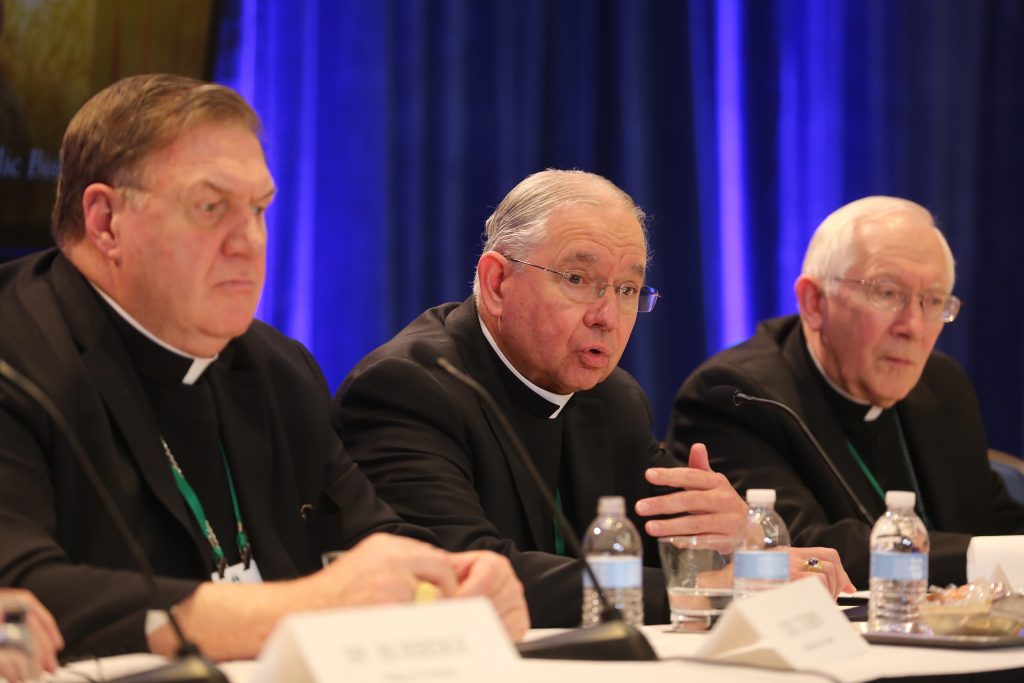KEY WEST — Politics typically has repercussions both in terms of the style and substance, and rarely was that combination more clearly on display than in the results of Nov. 12 balloting for the new leadership of the United States Conference of Catholic Bishops (USCCB).
In a widely expected result, the American bishops elected Archbishop José H. Gomez of Los Angeles as their president. Capping a more wide-open race, the bishops also chose Archbishop Allen Vigneron of Detroit as their vice-president.
The election of the 67-year-old Gomez was more or less a foregone conclusion, since, in general, the bishops have the custom of electing the conference’s sitting vice-president to the top job. Yet however anticipated, the choice of the first-ever Hispanic president of the U.S. bishops’ conference nevertheless comes at an especially meaningful moment.
A Mexican-born naturalized U.S. citizen, Gomez becomes perhaps the most nationally prominent Hispanic immigrant in America at a time when immigration forms one of the most contentious issues in the country’s public life, offering a clear signal of the solidarity of the U.S. bishops with the nation’s immigrant community.
That’s not just mere symbolism, because Gomez is also among the most outspoken defenders of immigrants and immigrant rights among the American prelates.
Just hours before his election in Baltimore, Gomez dispatched a statement urging prayers and legislative action as the Supreme Court heard arguments for and against the Trump administration’s decision to end the DREAM act, which protects immigrants brought into the U.S. as children from deportation.
“In this great country, we should not have our young people living under the threat of deportation, their lives dependent on the outcome of a court case,” Gomez said.
The symbolic resonance of his ascension to the top job in the bishops’ conference applies just as well to the U.S. Catholic Church as to the broader culture and its political dynamics.
Already, roughly one-third of the Catholic population in the U.S. is Latino, a share that’s projected to reach 50%, meaning a majority, by mid-century.
Today, much of the growth and dynamism in American Catholicism is fueled by its burgeoning Hispanic wing, and the choice of Gomez clearly puts an exclamation point on what one expert more than a decade ago termed the “browning” of the Church in the U.S.
Among other implications, the choice of Gomez likely means the U.S. bishops will be active in national debates leading up to the country’s 2020 elections, in which the hardline immigration policies of the Trump administration are likely to be a much-discussed topic.
At the level of ecclesiastical politics, Gomez’s victory also suggests that a majority of the U.S. bishops were looking for someone who’s fully on board with the social justice agenda of Pope Francis, but perhaps just slightly more cautious when it comes to Catholic doctrine and practice.
A priest of Opus Dei, Gomez has long had a profile as a moderate-to-conservative, though he’s never been identified with bishops perceived as part of any “resistance” or “opposition” to Francis.
The sense that’s what the U.S. bishops wanted is reinforced by the selection of Vigneron, 71, elected with 151 votes on a third-round ballot, beating out Archbishop Timothy Broglio, who leads the Archdiocese for Military Services and received 90 votes.
In general, Vigneron is seen by most observers as very similar to Gomez, a moderate-to-conservative not given to improvisation. He’s a longtime ranking member of the leadership of the U.S. bishops, most recently serving as secretary of the USCCB and as chairman of the Committee on Doctrine. Prior to his appointment in Detroit in 2009, he was the bishop of Oakland, from 2003 to 2009.
There are a couple of interesting twists that make Vigneron’s victory especially interesting.
First, in August 2018, when Italian Archbishop Carlo Maria Viganò released his bombshell accusation against Francis of covering up misconduct allegations against ex-cardinal and ex-priest Theodore McCarrick, Vigneron was among several American prelates who called for the charges to be taken seriously.
“We have nothing to fear in facing squarely the allegations made by Archbishop Viganò,” Vigneron said in a statement. “Whether the archbishop’s claims are confirmed or proved to be unfounded, the truth which comes to light will show us the sure path to the purification and reform of the Church.”
While Vigneron certainly did not endorse Viganò’s accusations, the fact that he even addressed them in such a fashion disappointed some defenders of the pope. It will therefore be interesting to track how his relationships with Vatican personnel take shape, at a time when some Francis loyalists already have an ambivalent view of the U.S. bishops.
Second, it’s significant that given his age, Vigneron will be 71 and thus within one year of the mandatory retirement age for bishops when, three years from now, he presumably will be a candidate for president.
While there’s nothing in the USCCB bylaws that would prevent a retired prelate from serving as president, that might give some bishops second thoughts next time about automatically elevating Vigneron to the top job, or it could even induce Vigneron himself to stand down, although it’s also not unusual for bishops to continue to hold their positions for a year or two past 75.
As the balloting unfolded in Baltimore, there was some speculation that the most ardently pro-Francis bishops in the conference were backing Vigneron on the grounds that in three years, presumably after Francis has appointed a greater share of the conference, they might have the opportunity to pick both of the top officers at once.
It remains to be seen if that’s how things play out, but for now one thing is certain: At a critical time for America’s politics and culture, the bishops of the country have elected a president certain to give voice to at least one signature aspect of the agenda of history’s most pro-immigrant pope.
That alone, arguably, is the stuff of which history is made.

